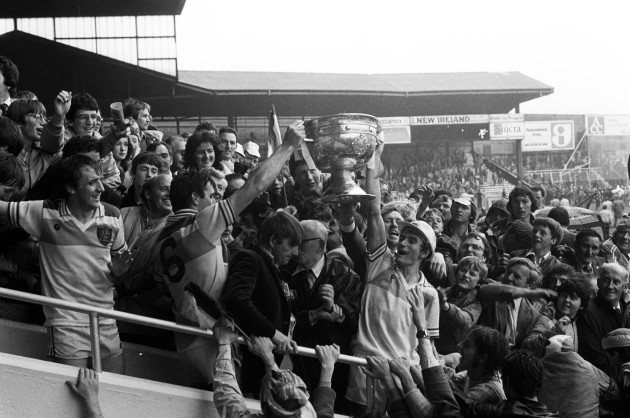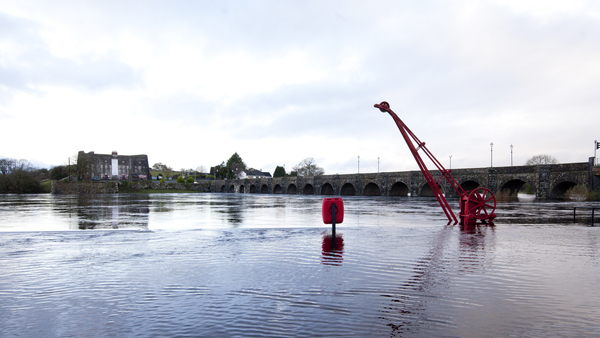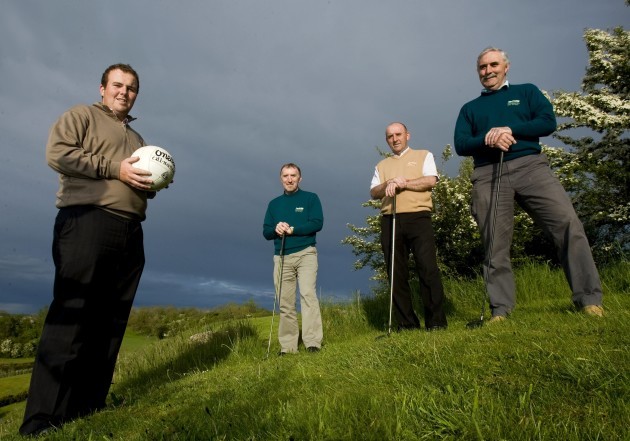SO THE FIVE in a row has finally been done.
What does it mean?
**********
Dublin are outwardly impervious to grand thoughts of legacy or sweeps of history, so let’s start by asking what it means for everyone else.
“We’re the last hold-outs!” grins Seán Lowry.
Kerry’s failure to deny Dublin what was denied them by Lowry’s Offaly in the 1982 All-Ireland final means he and his team retain their status as the GAA’s most storied renegades.
While that team’s place in history is fixed, everything around them has shifted, tilted and irrevocably moved.
“When I was playing, we used to beat Dublin with one hand behind our back”, says Lowry.
“This is in the ‘70s, when I was playing first with Offaly. I remember once beating them by 10 or 12 points, there wasn’t a thousand people from Dublin in Croke Park at it.
“GAA wasn’t as popular then. You played soccer, followed United and looked up to people like Liam Brady. Then Heffernan began to make it popular and it evolved from there.
I remember we were playing in the Railway Cup with Leinster one day, and Paddy Cullen was the sub goalkeeper behind Martin Furlong. I’ve a brother in law in Dublin, a Dub through and through. He used to say that they should allow the country people working in Dublin to play for Dublin.
“Paddy said, ‘No way – then they’d say they won it for us!’”
Times change. Dublin haven’t lost a Championship game since 2014 and a Leinster opponent haven’t finished within a single score of them in seven years. Maybe Cullen’s nightmare is more palatable once-removed.
“Funding comes because of popularity: if you’re not popular, sponsors won’t line up”, says Lowry.
“It’s up to everyone else to raise the bar. Population is an advantage, of course.
“My theory is that an awful lot of country people went up to Dublin to the civil service, married the girl across the office, and they stayed in Dublin.
“The GAA was bred in them.
“They brought the GAA with them and they set up all these clubs around Dublin. St Jude’s, Oliver Plunkett’s – first-generation country people set them up and their children are Dubs.
“Ciaran Kilkenny’s mother is a Laois woman, the Brogans’ mother is from Kerry and their grandfather is from Mayo.
“I honestly think that everything is geared toward Dublin.
“Today, the young people go to Dublin to work, then they meet someone and buy a house in Templeogue and we are all losing out down the country.”
Lowry now lives on the fringes of Shannonbridge in West Offaly, having moved there to work for the ESB.
With stone fortifications either side of a long, narrow bridge across the Shannon, the place was built for enemies other than progress.
The peat-burning power station dominates the skies around Shannonbridge, while uncertain roads punctuated with ‘Caution: Steep Verge’ signs map a way across boglands to the village.
Shannonbridge is teetering on a verge of its own.
ESB and Bord na Móna have been the area’s main employers for decades, albeit beneath the Damoclean reality of the bog’s creeping end.
Thus Bord na Móna closed 17 bogs last year alone, and have resolved to stop burning peat by 2028.
They tried to mitigate job losses by asking for planning permission to burn biomass along with peat at the Shannonbridge power station, but were refused. The biomass would have to be imported, and the ESB were told that continuing to burn peat is “unjustifiable in the current climate change era.”
The station now faces closure and the loss of 380 permanent and seasonal jobs. Whereas Croke Park can do their bit for the future by banning single-use plastics and earn kudos from all quarters for doing so, the reckoning with what’s to come for other parts of the country is a tangled and complex thing.
“The local narrative would be one of loss”, says parish priest Tom Cox, and it’s borne out by a crawl through the village. Bar a couple of heroic hold-outs living off the summer’s tourism, the primary school opposite the church is closed and abandoned, declining and becoming enveloped by unruly growth.
A butcher shop opposite a garish Supermacs is vacant too, as filthy windows fitfully light cracked tiles and drooping, faded newspaper posters freezing sporting achievements.
And these are only the ghosts that linger – the village has lost a library and the branch of a bank with little trace, and now faces something greater still.
“There has been a sense of apprehension and now the guillotine has fallen”, says Fr Cox.
“As of 1 January it looks like it will be a whole new world.
“But there is a bigger issue than just Shannonbridge: we live in a country in which more than 50% of our GDP is generated in the Greater Dublin Area.”
The world has shifted, albeit not just in response to Dublin’s gravity.
“Yeah it’s gone and Ferbane is the same, it’s beyond rescue”, says Lowry.
“The motor car has a lot to do with it. People have a lot of money now. When they have a bundle of money they go to Athlone to Tesco, Aldi, and Lidl. Growing up we had no option, you went to Ferbane and it kept everything going.
“Time goes on and this is the natural progression.”
In the GAA, time has reached the point at which the five in a row in the men’s game is no longer just something thwarted.
Once a barometer beyond greatness, now it has been reached by a side making it look as natural as brushing their teeth in the morning.
Lowry readily admits Dubin are the greatest team to ever play the game, and Jim Gavin would be proud to hear him eschew individual praise in favour of the collective.
“It’s probably the team ethic. I think the biggest difference between the two teams was Dublin backed up one another all day long.
“Every time a Dublin player got in trouble, they had someone off their shoulder. Kerry didn’t have that. When they got into bother, there was often no one there. Maybe they weren’t athletic enough. I don’t believe you could get on the Dublin team without being an athlete.
“Being a good footballer isn’t good enough anymore. If you’re not an 11-second 100-metres man, you can throw your hat at it.”
Did he ever foresee the game demanding as much as it does today?
“Sure you couldn’t see that coming. But you’ll interview someone in ten years’ time and they’ll say the same, at the level it’s gone to at that stage.
“We don’t know what that will be yet or how it will look, but someone will do something differently. “It’s evolving, and changing all the time.”
Just like everything else.
**********
We ask what the five in a row means to Dublin as they’ve never really told us.
They sloughed off all mention of it ahead of the final, with Michael Darragh Macauley telling RTÉ ahead of the drawn game that the number five no longer meant anything to him. A couple of players made reference to it amid the immediate ecstasy of full time in the replay, and Philly McMahon thrust an open hand to Hill 16 in celebration.
Many others, however, said this would be merely the latest notch on their journey with Dublin and they have no intention of stopping here.
They deliberately filtered out talk of their tilt at history in preparation, and cognisance of success and achievement has always been seen as a self-defeating thing in the Dublin camp.
Before the 2017 final win over Mayo, the dressing room bore a banner reading “success will follow you precisely because you had forgotten to think about it.”
Lowry takes a different approach to Offaly’s in ‘82. He talks with reverence of Michael Foley’s book on the final, Kings of September, along the recent TV documentary, Players of the Faithful.
“I love to see it done, as it is there in the archives for the children’s children’s children to look back on. Far too often we don’t do that, we don’t make it until it’s too late.”
His side’s approach to the media was indicative of a different era, too. Journalist David Walsh was allowed to train with the side the week ahead of the final, while manager Eugene McGee kept a column in the Sunday Tribune throughout the year.
In spite of all of the differences, there are similarities between the two teams who find themselves defined by the opposite sides of the five in a row.
Jack McCaffrey spoke to reporters in the team hotel the morning after the All-Ireland success and talked about the future. “We did a bit of an exercise earlier this year where we paired up and you said to the other lad what you respected in them. I was with Bernard Brogan and I just ended up saying to him in 25 years I can see myself texting you, ‘Will we grab lunch?
“What brings us together is we’re decent footballers and playing well together. What I love about this group is that I am really good friends with them and I have a deep, deep love for them.”
Lowry says the bond remains between the ‘82 team, and they meet up every fifth September to talk about, around and beyond their legend.
He tells a story which may elucidate what the five in a row might mean to a Dublin side outwardly allergic to mythmaking.
In the week leading up to the final in ‘82, Lowry’s aunt passed away. Sitting in his cousin’s house after the mass, a stranger sat beside him and told him that he hadn’t begun to realise what he was playing for on Sunday.
The stranger spoke of how he spent his youth crouched with neighbours around a radio listening to Michael O’Hehir paint All-Ireland finals, allowing listeners to worship men they may never see.
“That’s what will happen to you on Sunday. You are playing for people who you will never, ever meet.” The encounter squatted in Lowry’s head.
“He looked at it from a different perspective. We were thinking about Offaly supporters. What that got me thinking about was those in America and Australia, those who couldn’t come home.
“You can imagine what they would feel like if you did win the All-Ireland. Even though they were thousands of miles away, imagine how they would feel, with their chests out. Imagine what proud Offaly people they would be.”
He sculpted and polished it across the days leading to the final, and tipped off Richie Connor that he had something to say in the dressing room before throw-in. After Eugene McGee had said his bit, Connor counselled further silence as “Seán Lowry has something he wants to say.”
“Now lads”, began Lowry with practised words but unrehearsed emotion. “You’re not just playing for yourselves today. You’re playing for your family and your county and for people you’ll never see or meet.
People from all over the world this weekend, from places like America, Australia, New Zealand, they’ll all have their chest out on Monday if you beat Kerry.
“You’ll never see them. There are old people living down small country roads all over Ireland who are rooting for you today, but you’ll never meet them and you’ll never realise the huge lift you’ll give all those people if you go out and beat Kerry today.”
Liam Currams would later tell Lowry he knew Offaly would win from the moment the speech was finished.
McGee wrote the same in his book, and years later, phoned Lowry to ask what he had said. Lowry typed it out and emailed it back.
It was Lowry who held the ball when PJ McGrath blew for full-time to confirm Offaly’s ransacking of all sense and expectation.
Given only the players were rewarded with medals, Lowry and some of the senior players decided that the football would be McGee’s token of history. Before handing it over, Lowry had it inscribed by Sr. John Manning, a Kerry nun working in the primary school in Ferbane.
Along with the date and score, she added ‘Uíbh Fhailí, Mo Cheol Sibh; Ciarraí, Beidh Lá Eile’.
As the years passed, the ball became a rod for rumour. Some claimed McGee raffled it in support of Matt Connor; several more claimed they knew who had it.
Lowry saw McGee with it only once – at the launch of his autobiography. The ball didn’t make an appearance at the 25th anniversary gathering, although McGee told Lowry it would be donated to the Croke Park museum.
Sad circumstance brought Lowry and his team-mates together again in May of this year, at St Mel’s Cathedral in Longford for the funeral of Eugene McGee.
As the mass moved to the presenting of gifts to mark McGee’s life, Lowry’s wife Nuala nudged him in the ribs.
“What was the first gift? The ball!”
Later, as the priest moved to his homily in memory of McGee, Lowry was given another nudge.
“’Now lads, you’re not just playing for yourselves today. You’re playing for your family and your county and for people you’ll never see or meet…’
“Then he said, ‘That was the speech given by Seán Lowry before Offaly went out onto the field in ‘82.’
“The priest gave the full speech.
“I just thought to myself how proud I was. Where would you hear this?
“It’s amazing. This is 37 years after the fact, that’s what amazes me about it.”
Dublin’s place in Ireland and Gaelic football is unlikely to ever recede to the extent Offaly’s has, but time will move on for Jim Gavin and his players as it does for everyone else. It’s just about the only thing as remorseless as they are.
“I remember talking to the Galway guys from the ‘70s”, says Lowry.
“They lost the All-Ireland in ‘71 to Offaly, ‘73 to Cork and ‘74 to Dublin, so they won no All-Ireland.
“I asked if they meet up often and one of them said, ‘No, we never meet because we never won.’
“Our bond is always there. I still tell young fellas playing finals that this will stick with you for the rest of your life. You will always remember this, you will always cross the road to meet this person, whether it is in 20 or 50 years time.
“Here I am at 67 years of age, and I vividly remember what happened on fields in county finals and All-Ireland finals.
“It’s a fantastic thing.
“You say it’s permanent? Yeah, it’s permanent.”
The bogs surrounding Seán Lowry in Shannonbridge have always been an easy metaphor for memory and history, but truthfully they have become emblems of a vanishing age and an uncertain, diminished future.
Better to seek life’s dignities in sport’s permanent glories.





